
EveryDollar App
EveryDollar is your personal budget app. Create custom budgets, plan spending, track expenses, and more. For. Free.
Guide Contents

A budget is a plan for your money: every single dollar that’s coming in (income) and going out (expenses). When you learn how to budget—and make one every month—you give your money purpose. You. Take. Control.





Make your first budget in minutes. Track your monthly spending with ease. And know at a glance what’s left to spend—so you don’t overspend. Get started with EveryDollar today!
No matter how you feel about budgeting right now, no matter what money goals you have, and no matter what your income is—you can make (and keep!) a budget in just five steps. Seriously!
But first: Before you start, open up your online bank account or pull out those hard copy bank statements for the past couple of months. Trust us—it makes the process way easier when you can look back at your numbers.
Income is any money you plan to get during that month.
Create separate Income budget lines for every paycheck you (and your spouse, if you’re married) make, plus anything extra coming in (like a side hustle).

Do you have an irregular income?
If you’ve got an irregular income, take a look at what you’ve made the last few months and list the lowest amount as this month’s planned income budget line. You can adjust later in the month if you make more and add that extra money to your money goal or another budget line. Check out our Irregular Income Budget Planning form for more help here!
Now that you’ve planned for the money coming in, you can plan for the money going out. It’s time to list your expenses! (Yep, this is when that bank account or statement gets super helpful.)
Think through these main areas as you're jotting down expenses:

Subtract all your expenses from your income. This number should equal zero. We call this a zero-based budget.
Now, a zero-based budget doesn’t mean you let your bank account reach zero. Leave a little buffer in there of about $100–300.
It also doesn’t mean you blow all your money. And here’s the reason we love this method: Zero-based budgeting just means you give every dollar a job to do—giving, saving, spending. It’s all accounted for and has a purpose.

Tracking your transactions means you account for everything that happens with your money all month long.
That means when you make money, you track it in your budget. When you buy absolutely anything, you track it in your budget. This step gets your eyes on your spending—so you don’t overspend.
This is such a huge key to winning with budgeting (and money) that we have a whole section below about how to do it and why it’s important.
While your budget shouldn’t change too much from month to month, the fact is, no two months are exactly the same. That’s why you create a new budget every single month—before the month begins.
Start by copying over this month’s budget to the next. Then make changes for anything new that’s coming.
P.S. Having an accountability partner really helps during those first months of budgeting (and during the whole journey, tbh).
If you’re new to budgeting—this calculator is a solid starting point. Just type in your monthly take-home pay, and you’ll get an example budget to help you begin.
Enter your income and the calculator will show the national averages for most budget categories as a starting point. A few of these are recommendations (like giving). Most just reflect average spending (like debt). Don't have debt? Yay! Move that money to your current money goal.
What you really need is a monthly budget—a solid plan for how to spend every dollar you make. Because you work hard for that income! Make it work hard for you. Check out EveryDollar. For free. Today.
Start Budgeting for Free
EveryDollar is your personal budget app. Create custom budgets, plan spending, track expenses, and more. For. Free.

Use our envelope system to pay cash for those hard-to-wrangle budget lines (like Groceries, Restaurants and Entertainment).

With six colors to choose from, this leather wallet is the most stylish way to organize your spending.
Want to try the pen and paper method first? Download Dave Ramsey's budgeting forms from Financial Peace University to help you get started.
Ready for one of the biggest secrets for how to budget—and do it really, really well? Good, because we don’t want to keep it a secret. Here it is: Track. Your. Transactions.
Every single one.
It’s the fourth step in our five-step budgeting breakdown, and now we’ll dive into the how and why of this “secret” way to level up your budgeting.
Pro tip: If you upgrade to the premium version of EveryDollar, tracking becomes a breeze. You can connect your budget to your bank, so transactions stream right in. You just drag and drop them to the right budget line. Boom.
Listen: Tracking your transactions is super important because it helps you:
Every money goal starts with a budget. Because a budget is how you tell your money where to go. And if you want that money going toward paying off debt, saving for vacation, or prepping for emergencies . . . well . . . you need to budget for it.
Here are some tips for how to budget for your money goals:
If you don’t know which money goal to go after first, check out the 7 Baby Steps (aka the proven plan to save money, get out of debt, and build real wealth).
Pro tip: If your goal is to pay off debt or save for emergencies, it’s best to work those one at a time. After you free up your income and have the security of that stacked emergency fund, you’ll have margin to multitask on other goals like investing, saving for the kids’ college, or paying off your house.
If you’re trying to save money for a big expense, create a sinking fund. This is a way to save up by setting aside money each month. You just divide the amount of money you need by the months you’ve got to save. Voila. Now you know how much to put in your monthly budget for this money goal.
Like if you need $1,200 for a summer vacation in four months, you’d need to save $300 a month.
If you want to pay off debt, check out the debt snowball method.
If you want to save up an emergency fund, you need two things: a budget line for emergency fund savings and the mindset that this is a priority with your money!
Okay, but were does that money come from? The extra for your vacation savings or debt snowball momentum or emergency fund growth? Good. Question. Here are a few ways to get more money to put toward your money goals!
Some money goals take longer than others. Don’t. Give. Up. You have what it takes to pay off your debt, save for the future, build yourself legit financial security . . . the list goes on. Keep budgeting. Keep working. You got this!

From groceries to summer vacations and everything in between—a budget helps you spend and save on purpose. And these tips will help you do it all with confidence.
Do yourself a huge budgeting favor and get an accountability partner.
Here’s why: When you’re in the thick of making any goal happen, knowing you’ve got someone checking in makes all the difference. And budgeting on the reg is not only a great goal—it’s also the foundation of hitting all your other money goals!
Here's some info to help when you're looking for and working with your accountability partner.
Let’s be honest—sometimes all this budgeting stuff gets . . . well . . . exhausting. It can be tough to keep that financial drive alive.
Here are eight tips and tricks to keep the motivation going along the way.

If you’ve never budgeted before (or it’s been a while) jumping in can be challenging. You know what'll help you feel confident as you start? A budget template!

Is your paycheck different from month to month? Learn how to manage irregular income and create a budget that keeps you in control—no matter how much you earn.

Budgets: Can't hit your goals (or fight inflation) without them. But man, it can be hard to get things just right. You know what you need? This list filled with 15 of our favorite budgeting tips.
